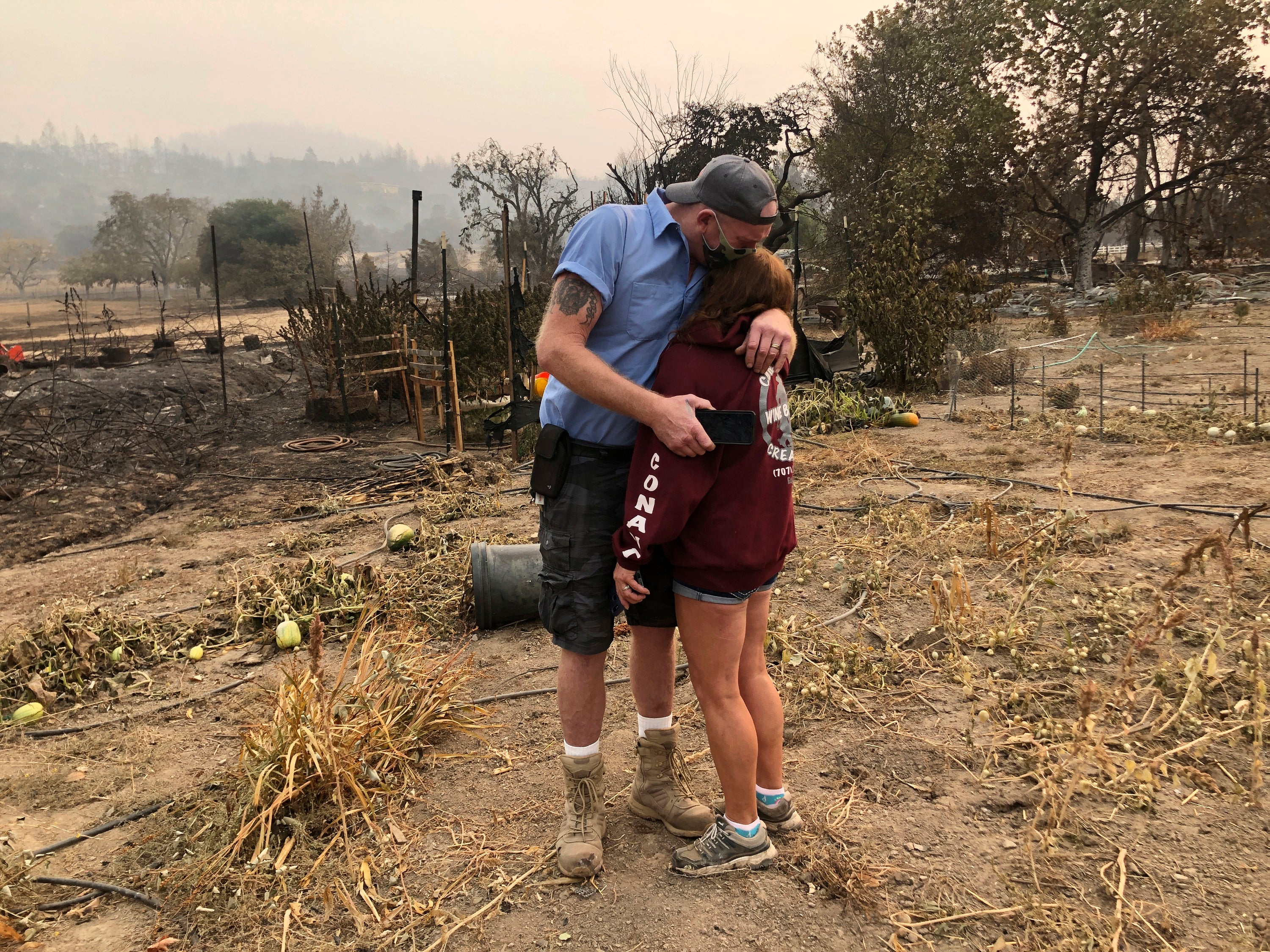California wildfire evacuees return home to find devastation
Wildfire evacuees in California wine country are returning to what’s left of their homes

Nikki and Kevin Conant returned to their home in California s wine country Wednesday to find only the charred remains of their home and wine-barrel repurposing business.
“It was like a part of me is gone, burnt up in the fire Everything we built here, everything we made here is gone," Nikki Conant said.
The couple, both 52, were preparing to evacuate Sunday when they saw an orange glow in the hills near their Santa Rosa rental home. Within 45 minutes, they could hear the trees crackling and propane tanks exploding as the blaze reached their community. They jumped in their car, and for what seemed like an eternity they were in bumper to bumper traffic.
“I thought we were going to burn alive. I really did. It was horrible,” Nikki Conant said.
Nikki sobbed when she spotted her burned chicken coop —her twelve beloved chickens all died in the fire. The couple repurposed old wine barrels into custom-made art and furniture, and all their tools were gone.
The Conants are among more than about 70,000 people under evacuation orders in the wine region north of San Francisco where the Glass Fire has incinerated at least 80 homes along with winery installations and other buildings.
Some residents say they are getting fed up with the annual evacuations and fire fears and are thinking of leaving California. But despite their harrowing experience, the Conants said they plan to remain in the area.
Their landlord already told them the home will be rebuilt and offered them to stay a trailer on the land while the house is finished, Nikki Conant said.
“This is home,” she said. “I was born and raised here, my family is here. I don’t have the heart to just give up and leave the area.”
Flames on Wednesday continued to tear through the region's rolling pastures, tree-covered hills and wineries amid hot and dry weather.
Heavy winds that spread new fires this week in the Napa and Sonoma wine country were reduced to breezes. But they were expected to return late Wednesday amid extreme heat and low humidity in weather conditions expected to last through Friday. Officials said they were requesting more fire crews to join 2,000 firefighters battling the blaze that has charred 76 square miles (197 square kilometers) with almost no containment.
The National Weather Service said the weather conditions would last for several days because of high pressure centered over the state. Heat advisories were in effect or pending along about three-quarters of the California coast, and many areas had poor air quality because of smoke.
Numerous studies in recent years have linked bigger wildfires in America to global warming from the burning of coal, oil and gas, especially because climate change has made California much drier. A drier California means plants are more flammable.
The massive blazes are also becoming harder to fight and on Wednesday, officials said wind-whipped flames led two firefighters to deploy the emergency fire shelters they carry.
The firefighters were assigned to the Glass fire in Napa County on Sunday when gusty off-shore winds fanned the fire, prompting them to deploy their fire shelters after flames overwhelmed them.
The firefighters covered themselves on the ground with the emergency shelters that look like space blankets if they are in imminent danger from flames. They were not injured, the California Department of Forestry and Fire Protection said.
It’s the third time that fire crews have had to deploy their fire shelters this fire season — a last-resort effort to save their lives that was once uncommon. On Sept. 8, 14 firefighters deployed emergency shelters as flames overtook them and destroyed the fire station they were defending in the Los Padres National Forest. Three firefighters were hospitalized and later released. A day later, a crew fighting a deadly blaze in Butte County was overrun by flames when winds shifted and its members escaped with only minor injuries after deploying emergency shelters.
About 150 miles (241 kilometers) to the north, the Zogg Fire, which also erupted during Sunday’s high winds and grew quickly, has killed four people, Shasta County Sheriff Eric Magrini said.
A man evacuated with severe burns Sunday died at a hospital of his injuries Tuesday Magrini said. Three others died Sunday.
The deadly blaze that spread to neighboring Tehama County has burned 81 square miles (210 square kilometers) and destroyed 146 buildings, about half of them homes. It was 7% contained.
The Glass and Zogg fires are among nearly 30 wildfires burning in California. Fire-related deaths total 30.
___
Rodriguez reported from San Francisco.
Bookmark popover
Removed from bookmarks